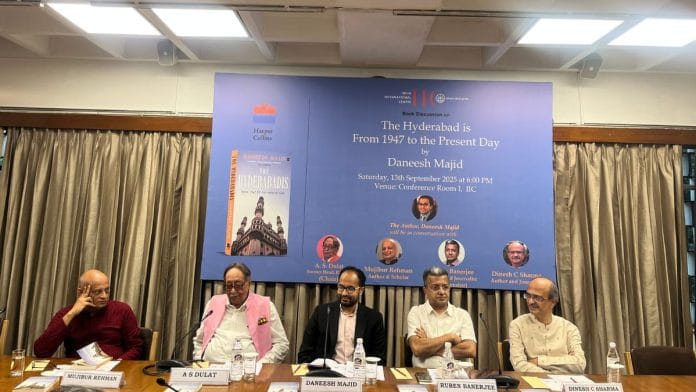New Delhi: Former Prime Minister PV Narasimha Rao was ashamed of his Muslim heritage, said Wajahat Habibullah, the former and first–ever Chief Information Officer of India, at the launch of The Hyderabadis by Daneesh Majid at the India International Centre. He was referring to the former prime minister’s understanding that the Nizam’s rule was tyrannical.
Habibullah’s declaration left the attendees in shock. Seated among the audience were many proud Hyderabadis.
Author Daneesh Majid was joined on the panel by former R&AW head AS Dulat, political science professor Mujibur Rehman, journalist Dinesh C Sharma, and Ruben Banerjee, former Editor-in-Chief of Outlook, who moderated the panel.
In attendance were also filmmaker Meera Dewan, author Rakesh Batabyal, and families whose stories the author had included in his book. The Hyderabadis is a collection of 10 stories covering the lives of ordinary people from September 1948—when the princely state was annexed—to modern day.
The launch coincided with the 77th anniversary of the annexation.
“Many muslims of Hyderabad had to contend with being the numerical minorities in a democratic setup, as opposed to being a ruling minority in a princely setup,” Majid said.
‘Delhi is babughar’
During his time at Siasat.com, the online version of the Urdu daily, Majid was tasked with interviewing famous Gulf NRIs from Hyderabad. After seeing the first cut with one of the interviewees, Majid’s boss Mir Ayub Khan chided him for focusing only on their achievements and leaving out the struggles completely. Struggles many Muslim families shared in the aftermath of the Police Action.
Majid feels the need to tell these stories, especially in a time when the history of Hyderabad is being looked at through a communal binary: Muslim rulers versus Hindu subjects.
“Hyderabad is a place where people are a little too easy. Writing a book is not easy. Hyderabadis have the talent, the ingredients, the stories, but there is a certain inertia. And it’s the reason they haven’t gotten these narratives out,” he told ThePrint.
For Dulat, Hyderabad’s rich culture goes beyond biryani and bangles. He joked that Delhi is a ‘babughar‘.
“Hyderabad is a city. Every Hindu has at least ten close Muslim friends. Just as every Muslim has at least ten close Hindu friends,” Dulat said.
The pluralistic fabric of the erstwhile Hyderabad state contributed to a seamless economy too, especially due to the contributions of communities such as the Marwaris. Hassan recounted an anecdote from DF Karaka’s Fabulous Mogul on the sixth Nizam of Hyderabad, who upon seeing his gardener discarding old vegetables, questioned him. He instructed the gardener to send it to all the nobility. As the rule of the day would have it, when you received a gift from the Nizam, you had to send back Ashrafis.
“Hyderabad’s economy did not require Mrs Sitharaman to organise it,” he said, drawing laughter from the audience.
Also read: The shifting phases of Delhi’s Mandi House—Institution, Memory, Resistance
‘Doesn’t come close to Lucknow’
Hyderabad has plenty to be proud of, said Dinesh Sharma.
According to him, the creation of Andhra Pradesh in 1956 meant the loss of Hyderabadi culture. However, the city’s multilingual and multicultural legacy has continued to contribute to its tolerant nature.
“I can speak four or five languages, having been born in Hyderabad. I don’t know Telugu that well, but I can read and write. And I can speak Marathi, Kannada, and of course, Urdu and Hindi,” he said.
Hyderabad’s public schooling, Chandra Babu Naidu’s economic reforms, and the conscious decision by the Nehru government for regional development after 1956 have all contributed to Hyderabad’s success as a modern city, the journalist added.
Majid reminded the audience of the legacy of people who have moved out of Hyderabad. He recounted Mirza Yasin, owner of Delhi’s iconic Midland Book Shop.
“That’s the beauty of Hyderabad. Whoever left never forgets it. And whoever comes, never wants to leave,” he said.
Not everyone agreed with the author’s portrayal of Hyderabad and its history.
According to Wajahat Habibullah, who is half Hyderabadi and half Lakhnavi, Hyderabad has much less to be proud of. The city’s Muslim population has been insular, distancing itself from the Hindu population, he said. The intermingling between the communities doesn’t come close to the harmony in Lucknow.
“Lucknow has never had a communal riot,” he said.
The discussion, however, also took a critical turn when the author’s choice of people for his 10 stories was questioned. According to R Mahalakshmi, historian and professor at JNU, the book lacks women’s stories.
“What Hyderabad gave me as a feminist, as a historian working on gender, as a political activist, is the Stree Shakti Sanghatana and We Were Making History—a phenomenal, seminal book about the Telangana armed struggle,” he said.
She’d like Majid to write a second volume and include these stories for a richer, more complete account of Hyderabad.
Priyanka Mehta is an alumna of ThePrint School of Journalism (Batch 3).
(Edited by Prasanna Bachchhav)






